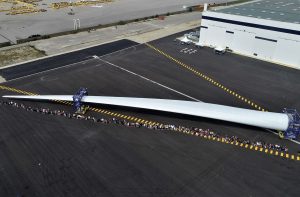
“Zebra project” launched to develop first 100% recyclable wind turbine blades
Canadian Plastics
Materials Research & DevelopmentThe turbines will be made from Arkema's Elium thermoplastic resin.

Photo Credit: LM Wind Power
Wind energy, both onshore and offshore, plays a critical role in the world’s transition to carbon-free energy sources. And with a product lifespan of 30 years, wind turbines currently have an impressive recyclability rate of between 85 to 90 per cent.
But a new cross-sector consortium wants to up that percentage even more through a groundbreaking project to design and manufacture the wind industry’s first 100 per cent recyclable thermoplastic wind turbine blade.
Announced on Sept. 23, the Zebra (Zero wastE Blade ReseArch) project, driven by France-based research and development institute IRT Jules Verne, brings together a range of industrial companies and technological centres – Arkema, Canoe, Engie, Suez, LM Wind Power, and Owens Corning – to tackle this new challenge.
Arkema has developed Elium – a thermoplastic resin already well-known for its recyclable properties by depolymerization or dissolution – for use in the Zebra project. Polymer formulation expert Canoe has recently developed an innovative recycling process of fibre-reinforced acrylic composite material by dissolution method providing a high added-value recovery of both separate recycled methyl methacrylate monomer and recycled fibre.
Next, France-based LM Wind Power – a designer and manufacturer of wind turbine blades – will be producing the blades, which will be the largest ever manufactured, at 107 meters in length.
In parallel, the other Zebra project partners will focus on developing and optimizing the manufacturing process by using automation, to reduce energy consumption and waste from production. Project partners will then explore methods to recycle the materials used in the prototype blades into new products. Finally, a life cycle analysis will assess the environmental and economic viability of further utilizing the thermoplastic material in future wind turbine blades.
“Demonstrating a circular approach to wind turbine blades throughout their lifetime requires mobilizing a strategic consortium covering the whole value chain to guarantee valuable and precise industrial data and achievements,” said Céline Largeau, Zebra project manager, IRT Jules Verne. “The Zebra project is a great opportunity to join together Arkema, Canoe, Engie, LM Wind Power, Owens Corning, and Suez who are key leaders in the wind energy sector. We look forward to carrying out constructive work altogether to improve wind energy performance and efficiency.”
The project has been launched for a period of 42 months with a budget of 18.5 million euros (US$21.8 million).
